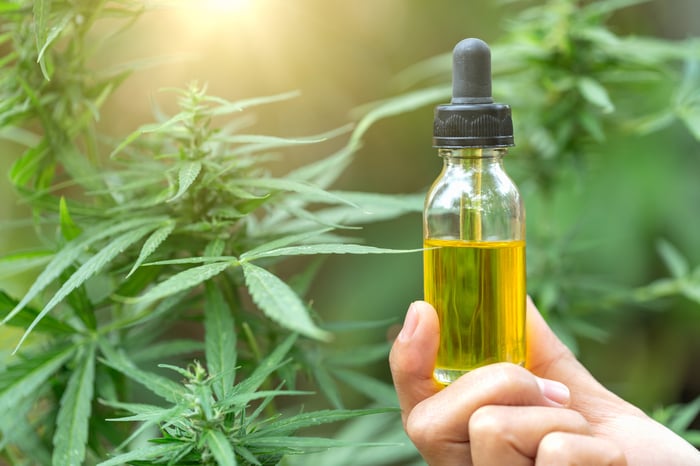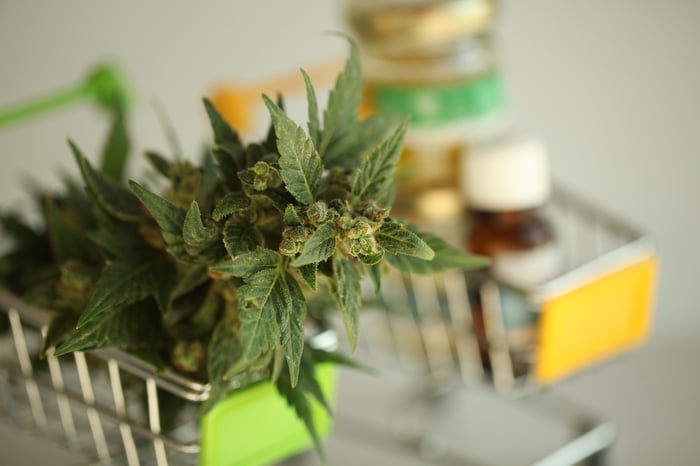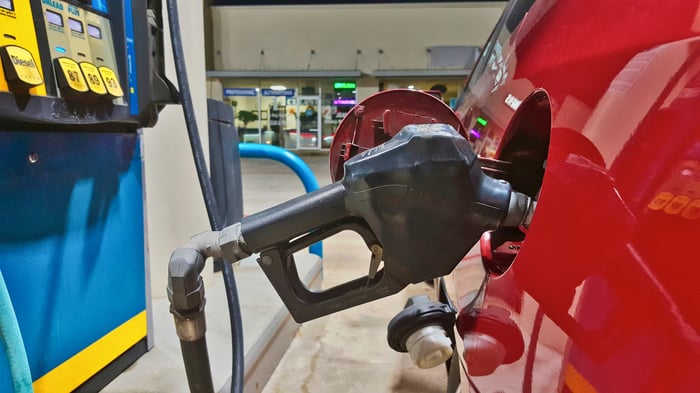You'd be hard-pressed right now to find a faster-growing industry than legal cannabis. Between 2018 and 2024, the newest report from Arcview Market Research and BDS Analytics, "State of the Legal Cannabis Markets," predicts a near quadrupling in worldwide licensed-store sales to north of $40 billion. This better than 24% compound annual growth rate through 2024 is a big reason behind the rapid rise in marijuana stocks in recent years.
But there's a niche within the marijuana movement that's generating even more buzz, without actually generating a buzz. I'm talking about cannabidiol (CBD).

Image source: Getty Images.
Cannabidiol has become Wall Street's "next-big-thing" investment
Cannabidiol is the nonpsychoactive cannabinoid best known for its perceived medical benefits. I phrase it as "perceived," because the U.S. Food and Drug Administration recognizes just a very small number of benefits for CBD, but otherwise views the cannabinoid as a large unknown that needs further testing.
But that's not the case among the public. People throughout North America appear sold on the idea of CBD-based derivatives and the potential medical benefits they could bring, ranging from relief of pain to halting anxiety. According to the Brightfield Group, sales of CBD products in the U.S. alone are slated to grow from $591 million in 2018 to $22 billion by 2022. For those of you keeping score at home, this works out to an annualized growth rate of 147%, which blows broader cannabis sales growth out of the water.
This surge in sales is being made possible by the 2018 passage of the farm bill, which was signed into law by President Trump in December. This new law allows for the legal industrial production of hemp, which is rich in CBD, and a heck of a lot easier and less costly to grow than cannabis plants (which also contain some combination of CBD and tetrahydrocannabinol (THC), the cannabinoid that gets users high). This means hemp plants can become the source for CBD extraction in the U.S. in the months and years to come.
Make no mistake about it, quite a few large-scale Canadian companies have jumped at the idea of becoming major CBD players in the United States. Six of the 14 major Canadian cannabis growers have announced plans to enter the U.S. market, with another three growers expected to outline their plans, or make the jump, within the next year. The opportunity is simply too big to pass up, especially considering that CBD-infused derivatives (e.g., oils, edibles, infused beverages, topicals, and concentrates) have much higher price points and juicier margins than traditional dried cannabis.
But there's one facet of this plan to enter the lucrative CBD market that investors seem to be overlooking: that the U.S. CBD and hemp market is considerably more diverse and crowded than the Canadian cannabis market.

Image source: Getty Images.
CBD competition could be a bigger drag than most investors realize
Some of the biggest names in the weed industry expect to make their presence known in the United States' CBD market, including Canopy Growth (CGC 2.41%), HEXO (HEXO), and Tilray (TLRY).
As a brief summary:
- Canopy Growth is spending $150 million on a hemp-processing facility in New York State, and also acquired Colorado-based intellectual property company ebbu in November, which can aid the development of CBD-infused derivatives.
- HEXO announced the formation of a U.S. subsidiary a few weeks ago, with its quarterly report noting its intention to push CBD products into eight U.S. states in 2020.
- Tilray acquired North American hemp foods company Manitoba Harvest for about $310 million in March. Aside from gaining access to a distribution network of more than 16,000 retail stores, Tilray can use this network to develop and sell CBD products in the United States.
This plan to enter the U.S. market and take advantage of lofty sales growth potential in the CBD market sounds great on paper. But it overlooks the fact that, with industrial hemp production now legal, and established players already entrenched in the CBD market (e.g., Charlotte's Web and CV Sciences), it could be an uphill climb for these established brands.
Making matters worse for the trio of Canopy Growth, HEXO, and Tilray is the fact that smaller hemp and CBD-derivative players have access to financing options in the United States. The financing advantages these Canadian marijuana giants have in Canada don't translate to the United States.

Image source: Getty Images.
Also, don't forget about the role general stores are expected to play in the U.S. CBD market. Arcview and BDS Analytics note in their latest report that two-thirds of all CBD sales were still occurring in licensed U.S. dispensaries as of 2018. But by 2024, 70% of all CBD spending is expected to occur in general retail stores, such as a supermarket or gas station convenience store. Companies like Canopy, HEXO, and Tilray are built more around the idea of brand building within the confines of licensed dispensaries. They aren't necessarily tooled to succeed in the diverse general retail environment.
Now, don't get me wrong. CBD can still be a potential needle mover for Canopy, HEXO, and Tilray. These companies wouldn't be investing so heavily in U.S. infrastructure if that weren't the case. These investments, though, are also meant to lay the groundwork for a hopeful change in U.S. federal marijuana policy. But expecting Canada's largest pot stocks to be runaway winners in the U.S. CBD market may be a stretch. The needle may not move as much as investors expect given the diversity of competition and challenges this trio could face in the U.S. hemp/CBD market, and that's something investors should take into consideration.





